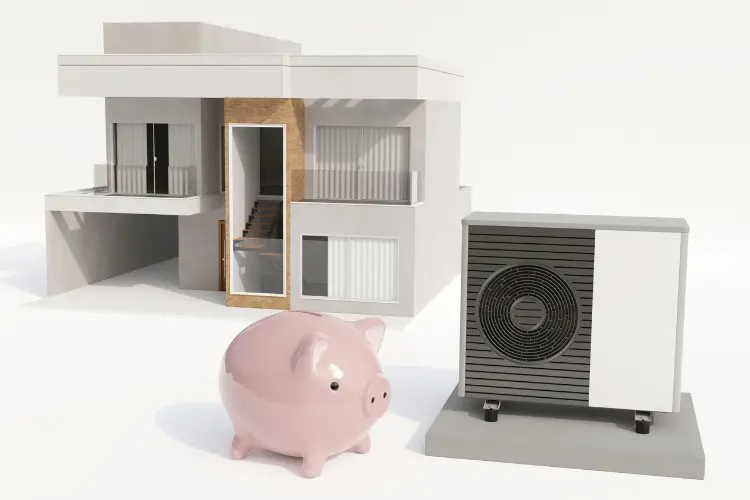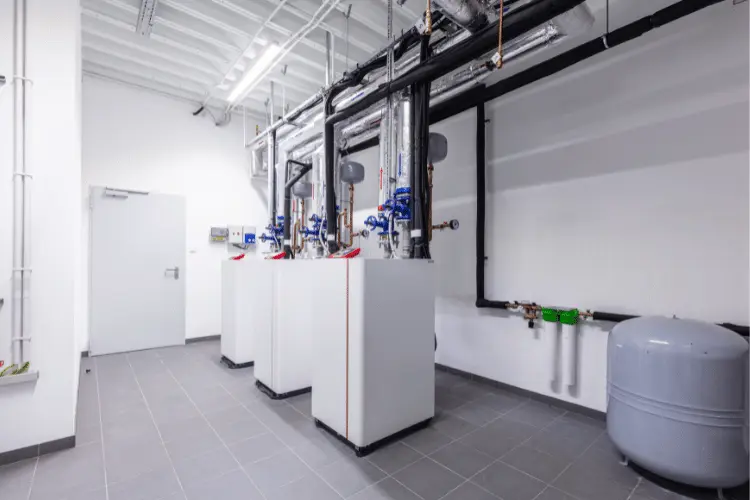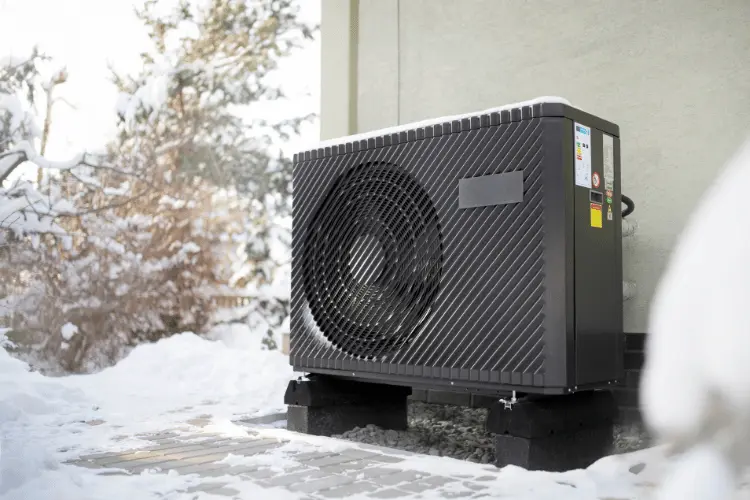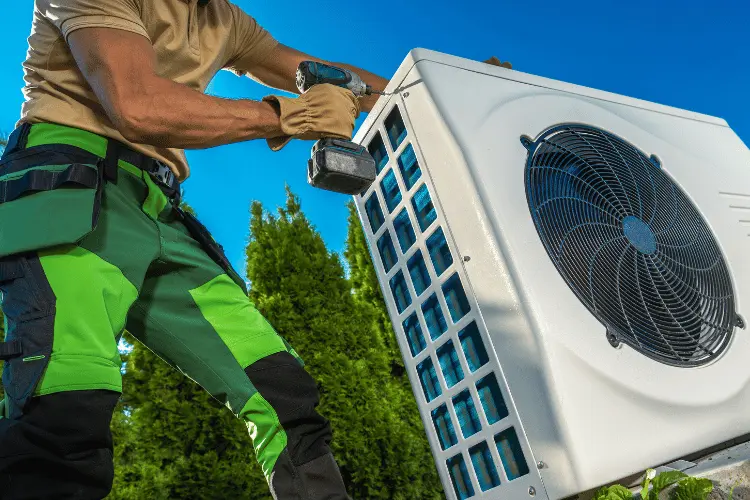
- By greenair-cy
- In Heating
The Revolution of Geothermal Heat Pumps
Geothermal heat pumps represent a significant leap in our quest for sustainable living. By tapping into the earth’s stable temperatures, these systems offer an innovative solution to heating and cooling needs. Unlike traditional methods that rely heavily on fluctuating external temperatures, geothermal technology maintains a consistent performance year-round.
The mechanism behind a geothermal heat pump is both simple and extraordinary. It capitalizes on the earth’s constant underground temperature to regulate your home’s climate. This process not only increases energy efficiency but also reduces our carbon footprint, making it a cornerstone of modern, eco-friendly living.
The adoption of geothermal heat pumps is more than just a trend; it’s a revolution in how we approach environmental responsibility and energy consumption. As we delve into the intricacies of these systems, it becomes clear why they are fast becoming a preferred choice for eco-conscious homeowners and businesses alike.
Understanding Geothermal Heat Pump Technology
The Basics of Geothermal Heating and Cooling
Geothermal heat pumps operate on a simple yet ingenious principle: the earth, below the frost line, remains at a constant temperature year-round. These systems harness this stable heat during winter and use the earth as a heat sink during summer. It’s a seamless cycle that offers both heating and cooling solutions.
Types of Geothermal Systems
There are several types of geothermal systems: closed-loop, open-loop, and hybrid systems. Closed-loop systems circulate a water-based solution through pipes buried underground, while open-loop systems use groundwater. Each type has its specific applications and benefits, tailored to different environmental and residential needs.

How Efficiency is Measured
The efficiency of a geothermal heat pump is measured by its Coefficient of Performance (COP). It indicates the ratio of heat energy output to electrical energy input. A higher COP means greater efficiency, and geothermal systems typically have a COP ranging from 3 to 5, far surpassing traditional HVAC systems.
Environmental Impact
Geothermal heat pumps are a giant leap toward reducing our carbon footprint. They emit no greenhouse gasses onsite and use a small amount of electricity, which can be sourced from renewable energy. This technology aligns perfectly with global sustainability goals.
Comparative Advantages of Geothermal Heat Pumps
Efficiency Comparison with Traditional Systems
When compared to conventional heating and cooling systems, geothermal heat pumps stand out for their remarkable efficiency. They use 25%-50% less electricity than standard systems. This significant reduction in energy use translates into lower utility bills and a smaller environmental impact.
Cost-effectiveness
While the initial installation cost of a geothermal system can be higher, the long-term savings are substantial. Reduced monthly energy bills and maintenance costs mean that a geothermal heat pump can pay for itself within 5 to 10 years.
Reliability and Longevity
Geothermal systems are known for their durability and require less maintenance than traditional HVAC systems. The underground piping, an essential component of these systems, often comes with warranties of up to 50 years.
| System Type | Average Lifespan | Average COP |
| Geothermal | 20-25 years | 3.5 – 5 |
| Traditional | 10-15 years | 1.5 – 2 |
Installation Process and Requirements
Site Assessment
The first step in installing a geothermal heat pump is a thorough site assessment. This evaluation ensures suitability for a geothermal system, considering factors like land availability, soil composition, and local climate. These factors determine the type of geothermal system to be installed.
Installation of Underground Loops
For a closed-loop system, pipes are buried in the ground either horizontally or vertically, depending on the land area available. This installation is critical as it affects the system’s efficiency. Professional installation ensures optimal heat exchange with the ground.

Integrating with Indoor Heating and Cooling Systems
Once the ground loop is installed, the indoor unit is connected to your home’s existing ductwork. This integration requires careful planning to ensure the system operates at peak efficiency, delivering comfortable temperatures throughout the year.
Professional Installation is Key
Given the complexity of geothermal systems, professional installation by a certified technician is crucial. This ensures the system is installed correctly and operates efficiently, providing long-term, reliable heating and cooling for your home.
Cost Analysis and Long-Term Savings
Upfront Investment vs. Long-Term Benefits
The upfront cost of installing a geothermal heat pump system is often higher compared to conventional systems. However, considering the energy savings and lower maintenance costs, geothermal technology becomes an economically sound choice in the long run.
Energy Savings Over Time
Homeowners can expect significant reductions in their energy bills. With geothermal systems being remarkably more efficient than traditional HVAC units, the savings on monthly utility costs can be substantial, often offsetting the initial investment within a few years.
Government Incentives and Rebates
Many regions offer incentives, rebates, or tax credits for installing energy-efficient geothermal systems. These programs can substantially reduce the initial investment, making the switch to geothermal heating and cooling even more attractive.
| Cost Element | Geothermal System | Traditional HVAC |
| Initial Installation | Higher | Lower |
| Monthly Energy Bills | Lower | Higher |
| Maintenance Costs | Lower | Higher |
| Total Cost Over 10 Years | Lower | Higher |
Maintenance and Durability
Low Maintenance Requirements
One of the most appealing aspects of geothermal heat pumps is their low maintenance needs. The underground loops are virtually maintenance-free, and the indoor components typically require just routine check-ups, much like any conventional HVAC system.
Durability and Lifespan
The lifespan of a geothermal system is another major benefit. While traditional HVAC systems may last 10-15 years, geothermal systems can operate efficiently for up to 25 years or more, making them a long-term solution for residential and commercial heating and cooling.
Regular Professional Check-ups
To ensure optimal performance, it’s recommended to have regular professional maintenance check-ups. These check-ups can preemptively address any potential issues, keeping the system running smoothly for years.
Peace of Mind
Investing in a geothermal system not only means lower utility bills and less frequent maintenance but also offers peace of mind. The reliability and durability of these systems translate into comfort and savings for homeowners.

The Future of Heating and Cooling: Geothermal Heat Pumps
Innovations Enhancing Efficiency and Accessibility
The horizon of geothermal technology is bright with innovations aimed at enhancing efficiency and accessibility. As research delves deeper into material science and engineering, newer models of geothermal heat pumps are becoming more compact, efficient, and easier to install. This evolution is crucial in making geothermal technology a feasible option not just for new constructions but also for retrofitting in existing buildings. Expect to see advancements that reduce installation costs and time, making these systems more accessible to a broader market.
Integration with Smart Home Technologies
The integration of geothermal systems with smart home technology is a trend set to redefine home heating and cooling. Imagine a system that learns your schedule and temperature preferences, adjusts itself for optimal performance, and provides real-time data about its efficiency. This level of automation and intelligence in geothermal systems is not just a convenience; it represents a leap forward in energy management and conservation, aligning perfectly with the increasing demand for smart, connected homes.
Renewable Energy Synergies
Looking ahead, geothermal heat pumps are likely to play a significant role in the broader context of renewable energy solutions. As the grid becomes increasingly populated with renewable sources like wind and solar, geothermal systems stand out as a stable, reliable heat source. The synergy between different forms of renewable energy and geothermal technology could pave the way for fully sustainable, zero-emission homes and buildings.
Policy and Market Shifts Supporting Green Technologies
Globally, there’s a palpable shift in policies and market preferences towards greener technologies. Incentives, subsidies, and regulations are aligning to support the adoption of sustainable solutions like geothermal heat pumps. This policy support, combined with growing environmental consciousness among consumers, is expected to drive significant growth in the geothermal market. It’s not just about individual choice anymore; it’s about a collective movement towards more sustainable living.
Innovations on the Horizon
The field of geothermal technology is continually evolving. Ongoing research and development promise even more efficient and cost-effective geothermal systems in the future, potentially making them accessible to a broader range of consumers.
Global Trends Towards Sustainability
As the world increasingly focuses on sustainable solutions, geothermal heat pumps are set to become a more prevalent option in the heating and cooling industry. Their ability to leverage renewable energy aligns perfectly with global environmental goals.
The Potential for Widespread Adoption
With advancements in technology and an increase in environmental awareness, the potential for widespread adoption of geothermal systems is significant. In the coming years, we could see a notable shift in how homes and businesses approach heating and cooling, with geothermal technology at the forefront.
Conclusion
The journey through the world of geothermal heat pumps reveals a path not just to more efficient heating and cooling but to a sustainable future. The advantages of geothermal technology, from its energy efficiency to its eco-friendliness and cost savings, position it as a key player in the revolution of home comfort solutions.
Making the switch to a geothermal system is not only an investment in your home but in the planet. The long-term savings, coupled with the reduced environmental impact, make geothermal heat pumps a smart choice for those looking to contribute to a greener world.
As we look to the future, the role of geothermal technology in our homes and businesses is poised to grow. With companies like Green Air leading the way, homeowners have the support and expertise needed to make this transition smoothly and efficiently. Embracing geothermal heat pumps is embracing a future where comfort, sustainability, and innovation converge.
